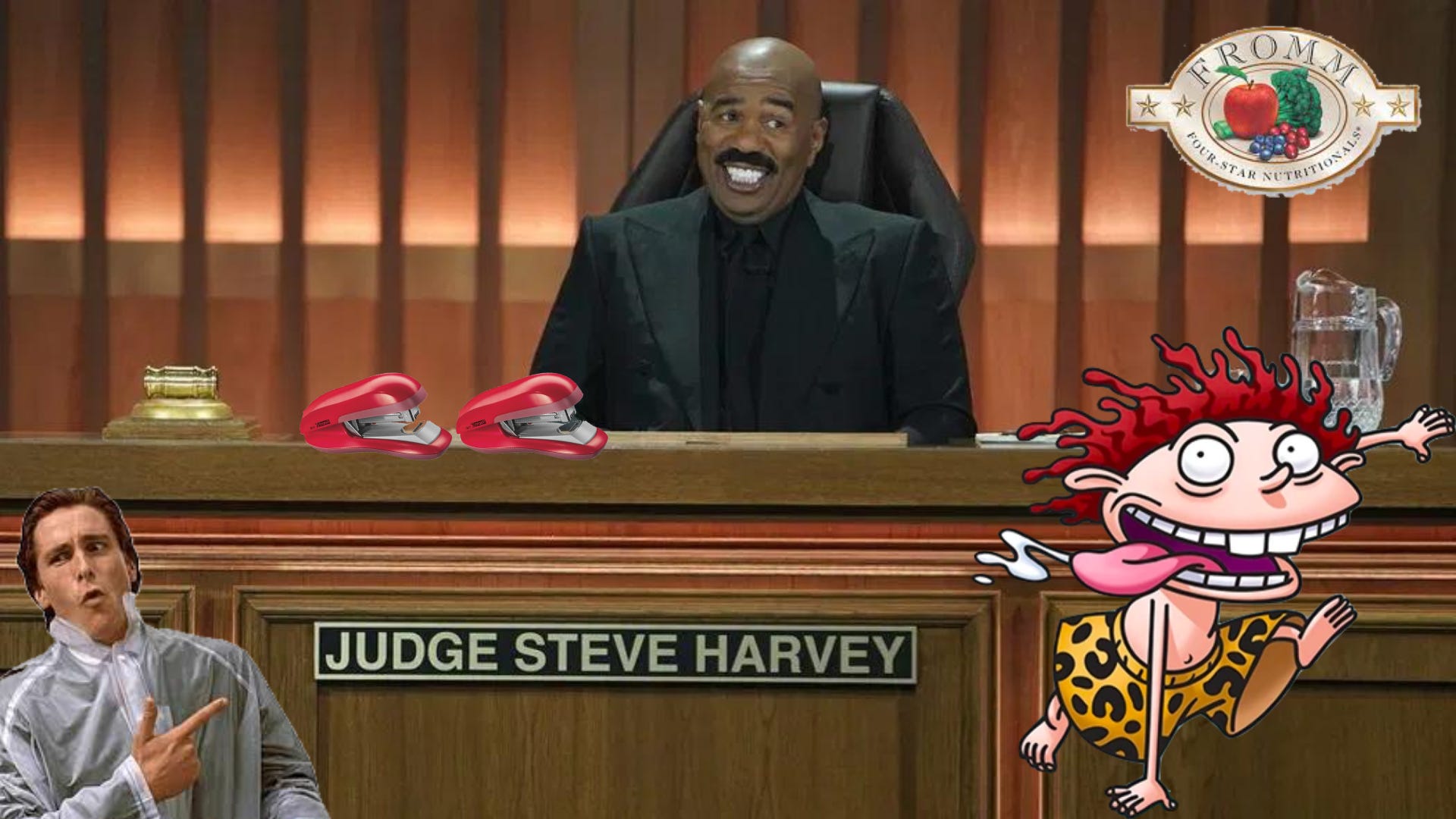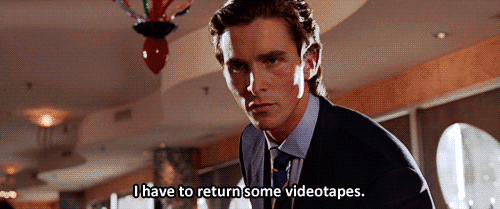Judgment is not the same thing as rejection.
Judgment is not the same thing as rejection.
Judgment is not the same thing as rejection.
I’ll say it three times so I remember.
My brain has a hard time discerning between judgment and rejection. I interpret every wayward glance and vocal intonation as a fully fleshed-out condemnation of my character. That, ladies and gentlemen, is what we call mental illness.
“Mental illness, what’s that?”
Mental illness is this cool brain feature that allows you to AHHHHHHHHHHHHHHHH!
The difference between judgment and rejection is subtle but important.
Judgment is something that happens on a whim. Everybody judges everything all the time. It’s our brain’s way of categorizing things. Without the ability to judge, we’d lose what makes us human. We’d be these fleshy blobs, careening through space in a vegetative state, never having an opinion or thought about anything. We’d be cows, essentially. I know I compared the entire human race to cows in my last article, I was just joking, you’re better than that. You have the ability to self-determine. Unfortunately, so does everyone else. Occasionally, two self-determining fleshy cow people graze their way into the same pasture, that’s when judgment happens.
I make an assessment of the other guy. He makes an assessment of me. I think, hmm, this guy seems trustworthy. He thinks, hmm, this guy seems like he’s got a huge penis.
Most judgment is pretty innocuous. Even negative judgment. I don’t care what you say about me in 99% of scenarios.
If you tell me I’m a bad bowler, I mean, yeah, fine. I don’t give a flying fuck about bowling. It’s boring.
But if you’ve been licking lane grease off your fingers since before you could walk, you might get offended if somebody judges your arm angle. Our reaction to judgment always says more about us than it does about the judgment.
The trouble happens when a judgment flies in the face of our deeply clung-to beliefs. Feelings get hurt when people don’t identify with the file cabinet you’ve put them in.
I had a girlfriend in high school, we’ll call her Mademoiselle Foucault. One day, in a fit of typical teenage melancholy, she texted me saying how ugly she felt. She was a heavy-set blonde chick with the type of curves you’re not supposed to have at that age. High school is like a judgment pressure cooker, and she was starting to get a lot of attention that she didn’t exactly know how to handle.
She was the “big boob girl” in high school, which gives you a lot of attention, but if you’re a BBW, that attention always comes with a but.
She’s kinda hot but… she could lose some weight.
She has big boobs but… it’s because she’s fat.
I’d let her titty fuck me but… I’m not gonna, like, date her.
How noble. Teenage boys are animals.
I tried to be reassuring.
“Don’t worry, I’m actually attracted to bigger girls.”
“Oh, so I’m a bigger girl now? What the fuck, Ryan?” She started crying. Her best friend gave me an earful.
Apparently, that’s not what a woman wants to hear in that situation.
I didn’t know! I was just being honest. I thought I was saying something nice! Turns out no, people don’t like being put into boxes they didn’t consent to being in.
This is why so many people, myself included, have real issues navigating judgment. It can be disassociating. It can throw your entire worldview into question. It’s very easy to start thinking in absolutes.
“People think I’m stupid Everyone says I’m gay. I’ll never be as cool as Patrick Bateman.”
These intellectual reaches can cause a lot of depression and anxiety, especially in young kids, which leads to all the anti-bullying campaigns you see now. Let’s be clear: We’re never going to get kids, or adults for that matter, to stop bullying each other. You can get rid of the wedgies, but it’ll only drive the bullying underground. It’ll only make it more subtle, more sophisticated, more anonymous, more online.
On the same token, trying to remove all judgment from society is a fool’s errand. It’s like trying to suck up all the air from the atmosphere. You could sit there all day, changing out oxygen tanks, but whatever judgment you remove will quickly be replaced with even harsher judgment. Any time you point to something and say, “You’re not allowed to judge this,” it’s the first thing people want to judge. New air always fills the void.
I think a better solution is to teach people how to deal with judgment— show them how they can use it to define themselves and become better people. And before we go any further, believe me, I understand this is way easier said than done.
As I’ve talked about before, I’ve got a bad case of rejection sensitive dysphoria, a common symptom of people with ADHD and bipolar disorder. All that’s just a fancy way of saying, I feel things way more than I should. Even though I can logically explain to myself that my reaction doesn’t match the crime, it doesn’t matter. Those feelings don’t just go away when someone says, “Don’t worry about it, man.” I know I shouldn’t worry about it, man. But I’m not a robot. It doesn’t matter how many Ryan Holiday videos I watch. There’s another side to my brain that cannot be ignored. Repression only leads to bigger problems down the line. I need to allow myself to feel whatever I’m feeling. That’s step 1.
Step 1: Allow yourself to feel sad
When someone judges my wife, she feels sad. She might cry a little. And then the next day, she’s over it.
When someone judges me, I feel sad for like a millisecond, and then I launch into a wild rage.
Judgment to me feels like when a moth flies by your head and scares you a little and you get uncontrollably angry and scream, “YOU MOTHERFUCKER,” and you chase it around the house, finally cornering it against the window and beating it to death with a slipper until it’s nothing but a smudge with wings.
That’s how I experience judgment, only I don’t get the satisfaction of destroying something beautiful. I just have to sit with that feeling. I have to let that moth land on my face and lay eggs in my nose.
In the adult world, you’re expected to take rejection in stride. My overreactions are seen as childish and petty. You're not supposed to make your emotions somebody else’s problem, which I think is by design. The cult of professionalism only prevents people from connecting on a deeper emotional level, keeping us divided and atomized. The further we get away from our emotions, the further away we get from ourselves.
When dealing with judgment, I think there’s a happy medium between autistic screeching and cold-blooded, lizard-person stoicism. You can decide what to do with the negative feelings later, but first, you need to allow yourself to feel them.
If you don’t, you run the risk of becoming a very repressed and angry person, walking around at a 9 all day because you’re 29 and still working an entry-level physical labor job.
After I quit my job at Home Depot in cataclysmic fashion, I took a job delivering office supply products as a stop-gap until I could find a writing job. The worst part of delivery jobs was easily the people. You have hundreds of interactions a day, mostly brief, but every once in a while, somebody seems determined to ruin your fucking day.
“Can you actually bring these five reams of paper up to the second floor? Sorry, we don’t have an elevator or a staircase. You’re gonna have to Mario triple jump onto the roof and drop down the chimney. Then you’ll have to race a penguin to the bottom of a big slide while this music plays, but be really careful not to fall off the sides and also watch out for random fireballs. Thanksssss.
"Mamma mia!"
Some days, I’d compound so many negative interactions in a row that by 3 p.m., I’d feel like the entire world was out to get me. I was having a particularly bad day when a lady at the Fromm dog food factory decided to give me attitude over a missing stapler.
“I mean, how fucking hard is it to remember two staplers? TWO. Not one. TWO!” She threw the signed invoice back in my face.
As the elevator door closed, I reared back and hocked a big fat fucking loogie all over the wall.
Not proud of it, but that’s what I did.
I spent the rest of the day practicing what I’d say if my boss called.
“I don’t know what she’s talking about, man… I mean, I guess I could’ve sneezed. I don’t remember every delivery, you know how it is...”
Thankfully, I never got the call. Why the fuck did I do that?
This wasn’t my first time losing control and probably wouldn’t be my last. I felt like I was on the edge of oblivion. After being released from the mental hospital, I was so depressed, so financially and creatively stagnant, so psychologically mixed up and angry that a part of me wanted to spit on that wall. I can sit here and act like it was a mistake, and it was, but that’s exactly how I felt about my life at that given moment.
I didn’t fully understand why I was losing control until I started reading about Carl Jung and the shadow.
“Until you make the unconscious conscious, it will direct your life and you will call it fate.”
— Carl Jung
Jungian writer Robert A. Johnson describes the shadow as “that dumping ground for all those characteristics of our personality we disown.” We deny socially unacceptable emotions to survive. Unfortunately, this doesn’t make them go away. Your shadow always finds a way out.
“If the lion in us wishes to roar but the goat bleats instead, we must pay for this substitution in one way or another. Payment will vary: For some, it will be experienced as depression, a loss of energy and enthusiasm, or a growing unconsciousness. For others, it can be uncontrollable, seemingly irrational behavior, during which life, fortune, profession, or marriage may be risked. In its most extreme form, the price may be a physical breakdown that can lead to illness or even death.” (p. 286 in Meeting the Shadow)
— From “Dialogue with the Demonic Self” by Hal Stone and Sidra Winkleman
I’d spent 28 years not living up to my potential, not expressing my emotions, not creating art of any substance— and my shadow was pissed. It’s one thing if you play by the rules and everything works out. It’s quite another when you’re broke at 29, working yet another entry-level physical labor job.
The anger I should’ve been feeling at myself was being misdirected and splattered all over the mirrored fiberglass elevator wall. I made the biggest mistake you can make when dealing with judgment: I tried to get revenge. You start to run into problems when you fight back. This is when the potential energy of sensitivity converts into the kinetic energy of vindictiveness, resentfulness and evil.
“Paul says, ‘Be angry, but do not sin.’ That has a contemporary ring for us. Sin is alienation. Do not let your anger separate you from others, but don’t suppress your anger either. Be angry, all right. But ‘do not let the sun set over your anger.’ That is again a poetic statement. It may mean, literally, before evening, make up. That’s one of the clearest meanings of it. But it may also mean never, not even at this moment when you are angry, let the sun set over this shadow. You see how beautifully it’s expressed. Do not let the sun go down over your anger. Do not let your anger lead to alienation.” (p. 133 in Meeting the Shadow)
— “The Shadow in Christianity” by Brother David Steindl-Rast
Accept responsibility for your pain. Don’t just immediately project it onto someone else. Don’t spread the pain. Accept it. Take the emotional hit of your own feelings.
“What is remarkable about this whole process is that when we have the courage to look at our disowned parts, they change. The raging lion licks our face. He does not need to take over our personality; he only needs to be honored, to be heard, to be allowed to speak.” (p. 288 in Meeting the Shadow)
— Stone and Winkleman
You’ve accepted the feelings, now it’s time to decide what to do with them.
Step 2: Judge the Judgment
When someone judges you, you should ask yourself two very simple questions:
Do I care?
Do they have a point?
When faced with judgment, a lot of people, especially on the internet, will immediately default to ad hominem attacks, trying to destroy the other person’s credibility. We’re going to skip that step entirely and instead focus on the only two questions that actually matter.
Do I care?
Well, do you?
If you have no emotional reaction to a judgment, well, great. We’re done here. I’m leaving.
If you’re still having an emotional reaction every time you replay the situation in your head, ask yourself:
Do they have a point?
Well, do they?
To help answer this, you should ask a series of follow-up questions.
First of all, where is this judgment coming from? Who is this person? What are the odds they’re fucking retarded? Do they have any expertise that would make them a good judge? Are they a professional bowler, or is it just some asshole heckling you from the bar?
Does the person have anything to gain by criticizing you? Are they dunking on you in public for clout? Are they competing against you? Are they trying to manipulate you emotionally? Are they just trying to fuck with you?
Finally, and most importantly, do you agree with the argument they’re making? Like, take all the emotion out of it— do they have a point? A lot of times, we get upset because they do. You’ve been putting off getting a gym membership and you feel even worse about it now because somebody’s made a comment about your back boobs.
A flap is a flap if you ask me.
The point is, you need to take stock of the actual argument and where it’s coming from before you can decide how to react.
Life is confusing. It can be hard to know who to trust. Which opinions do we allow to penetrate our soft and supple minds and which do we reject? Often the answer to that question can help illuminate our blindspots.
If you’re a stand-up comedian, like I was, and some woman in the audience yells out, “Your jokes are lazy,” (which actually happened), how would you react?
You can ignore the comment. You can tell yourself “She’s just drunk,” or “She’s just one in a thousand people, 999 of whom either liked my jokes or just didn't care. This is just the one asshole who decides the show needs to be about them.” You can minimize the incident in an effort to preserve your ego:
OR, you can do what I did and let it fuck up your life for a month.
The incident happened at a show in Milwaukee earlier this year. It was my third or fourth attempt at a comedy comeback after taking more than a year off. I had to do 15 minutes of jokes, and since I hadn't been writing jokes, I had to rely on a lot of old material, which tended to skew edgelord. I think that’s what made her mad.
I made a lot of jokes about white women in that set, which I swear wasn’t the intention. I’ve written thousands of jokes. Most don’t work. It just so happened that three out of the eight bits in my act were written about a white woman who annoyed me. Those are just the jokes that made it through the March Madness bracket, the gauntlet of trial and error. Turns out, people really like it when you talk shit about white women.
There was a lot of playful sexism in my old jokes, which tended to annoy white women who have really high opinions of themselves. I don’t regret my old jokes, I was just in a different mindset when I wrote them. I had more energy to fight back then.
“What if they made a rock climbing wall of gloryhole dicks?”
This was apparently the last straw.
“Your jokes are lazy,” the woman said.
I think I spoke for everyone in the room when I said, “… what?”
“Your jokes are lazy,” she said, standing up and storming out in front of everyone.
An awkward hush fell over the room. I waffled for my last two minutes on stage and then decided to close on some really stupid bit about Trump where I say the word cunt. I didn’t handle it well.
I was mortified. Like yeah, sure, fine, a lot of these jokes were written in 2016, but these were proven jokes. I’d used them at clubs and paid shows for years. These jokes got me to where I am, what am I supposed to do? Throw them away and do 15 minutes of brand-new material? Is that really what this paying audience wants to see?
All that said, she did have a point.
I was tired of being the controversial guy. The words didn’t have the same energy behind them as they once did. I was on autopilot. I wanted to open up and talk about my life more on stage— the only problem is, nobody wants to hear that shit. Nobody wants to spend their Friday night being privy to some 30-year-old loser’s therapy sessions, so I always had to revert back to the shocking stuff.
I think the comment bothered me so much because, in a sense, I was being lazy. I was back on my bullshit, drinking, smoking and staying out late. I was being lazy by not striving to reach my full potential. I knew I was capable of exploring way more meaningful subjects in my art. Stand-up just wasn’t the right medium for it. I didn’t have the courage to make the switch and focus on writing full-time. I was being lazy, just not in the way she meant.
Now four months later, I’m doing what I should’ve been doing all along— writing long-winded introspective articles that only like 14 people read. And I’m happy.
For the first time in a long while, I’m doing shit that actually makes me happy. And it’s all because I allowed somebody else to reframe my reality. Even if the judgment was meant to be a mean-spirited jab from somebody who thought she was taking down the patriarchy, or whatever, I was able to use it to facilitate my own personal growth.
I think you have to focus on the argument, not the person. People are stupid. They don’t even know why they feel the way they feel half the time. Remove the emotion and just allow yourself to exist in a world where that person is right, where their condemnation is Gospel.
OK, so I’m lazy. How did I end up this way? What am I hiding from? What do I need to do next?
Step 3: Decide if you need to change anything about yourself
Now that you’ve allowed yourself to feel the feeling, and you’ve decided whether or not you agree with the judgment that caused it, you can decide your next move. You have three options:
Decide that person has a point and change
Decide that person doesn’t have a point and lay out your reasons
Decide that person has a point, but realize you’re not going to change any time soon, so you should just figure out a way to not give a shit
What you choose depends on your own beliefs and values. The important thing is that you choose. You decide how this judgment is going to make you feel. You’re the ultimate arbiter of your own truth.
As long as you’re being honest, you’re moving your soul in the right direction— no matter what you choose to do.
If you decide the judgment is valid and you need to change— congratulations, you’ve grown as a person today.
If you decide you disagree with the judgment, great! You’re reaffirming your belief in yourself and growing a thicker skin.
If you decide the person has a point, but you know you’re not going to change any time soon, that’s fine, too. At least you’ve identified the problem and can start taking small steps to rectify it. This is a great way to figure out your long-term goals.
I knew I had a drinking problem for years before I quit. Every time I’d feel someone judge me, I’d feel upset, but I knew they had a point. I am well aware that the suggested serving size for Miller Lite is not eight cans.
Eventually, those judgments build up to a point where it becomes so abundantly clear that you need to change, you almost don’t have a choice anymore. You can use judgment as fuel to make those big life changes.
It’s important to acknowledge— you might be full of shit. You might not be at the level of awareness where you fully understand your unconscious mind. You might still have major blindspots that prevent you from being truly honest with yourself. You might try to convince yourself that you don’t care when you actually do, or vice versa. In other words, you might accidentally do this process wrong. Don’t worry.
This is completely normal. You’ll go through a thousand versions of “you” before you ever get close to the real thing, and even then you’re probably still wrong. It’s a never-ending process of death and rebirth. It’s called growth and it sucks.
Don’t get me wrong, this process sucks. It’s much easier to live like everyone else, being ruled by your emotions and calling it fate. But if you’re truly serious about living life according to your values, I think this process can help.
So judge me all you want. You might hurt me. In fact, you probably will. But I’m going to use that judgment to either reaffirm my values or evolve them. After 8 years on stage and 10+ writing online, I’ve learned that nestled in the pain of judgment, there’s an invaluable resource that can’t be found anywhere else. Until somebody holds up that mirror, you won’t be able to see your blind spots.
Now, I’ve got CCTV installed in every corner of my psyche. I’ve learned and relearned so many lessons by allowing myself to fail and be judged. And while it’s the thing I hate the most, I’ve used it to become impenetrable. There’s nothing to penetrate. I’m an ever-evolving, philosophical shapeshifter. I’m faster than you. I’m two steps ahead. And even if you do catch me, you’ll never be able to hurt me as much as I’ve already hurt myself.
Feel free to judge me in the comments.









